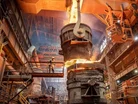PwC: Mining 'Needs Strong Circular Economy to Meet Demand'

PwC’s latest annual report on the global mining industry shares insights into how the sector is reinventing its role in the global economy, by mobilising the resources needed for sustainable growth.
One of its key areas of PwC’s 21st edition of ‘Mine’ – subtitled ‘Preparing for impact’ – is insight into how mining helps the world feed itself, by improving food security.
Another important area under focus is the role that the circular economy can play in helping the mining sector increase productivity, while becoming more sustainable.
The report is co-authored by Andries Rossouw, PwC’s Africa Energy, Utilities and Resources Leader, and Germán Millán, a Partner with PwC Chile.
Rossouw and Millán write that so-called ‘urban mining’ can reduce the environmental impact associated with traditional mining, mitigating issues such as land degradation, rock waste, water pollution and greenhouse gas emissions.
PwC: Urban mining 'reduces CO2 levels'
Urban mining is the idea of extracting valuable materials from waste, much of which would otherwise go to landfill or incineration.
An example of urban mining is the bid to recycle cement from demolished concrete buildings, to drastically reduce cement CO2 emissions.
Different minerals need to be mined in order to make cement, including limestone, clay, and gypsum.
Now, Scientists from Cambridge University have succeeded in reactivating used cement by exposing it to high temperatures in cement kilns.
The authors point out that this kind of urban recycling this shortens supply chains and reduces the reliance on imports.
But they also warn that urban mining comes with considerable challenges. In many areas, they say, the economics of recycling make no sense, and that the recycling process can itself generate hazardous waste by-products. They add that the supply of source material “can be erratic”.
These issues, say Rossouw and Millán, highlight a “pressing need for technological advancements to further refine and optimise urban mining processes”.
They cite innovations such as improvements in hydro- and pyrometallurgical processes, and new technologies such as AI, as ways to improve the efficiency of recovering materials from complex scrap sources.
Integrating AI into urban mining, they write, “will allow the industry to achieve higher efficiency, better material recovery rates, reduced costs and a lower environmental impact”.
Current AI applications in urban mining include advanced sorting technologies, supply chain optimisation and quality control
They caution, however, that leveraging AI across mining will itself increase demand for critical minerals and metals.
“Semiconductor chips are made from silicon, and they also contain such metals as copper, gold, tin, nickel, palladium and silver,” they say, adding: “Storage devices rely on metals such as platinum, palladium, and gold for their magnetic and conductive properties. Data centre facilities use vast amounts of metal in their construction. The demand for AI is contributing to an increased need for these metals."
Some metals recycling markets 'more mature than others'
Some metals recycling markets are more mature than others, the authors say.
“Copper has been recycled for centuries, because high-grade copper can easily be remelted,” the report states. “About 30% of the copper supply today is generated from recycled material.”
Platinum-group metals (PGMs) are also seeing maturity when it comes to recycling, the report says, saying that back in 2000 less than 5% of PGM production was recycled but that today the figure is 26%.
This is vital, says PwC, because PGMs are “renowned for their exceptional catalytic qualities”, and – given the relative scarcity of PGMs and escalating demand for them from various industry sectors – “the recycling of these metals is both economically advantageous and environmentally beneficial”.
As for critical metals – such as lithium and rare earth elements – recycling is at an emerging state of maturity, say the authors.
“Lithium’s primary use is in the manufacture of rechargeable lithium-ion batteries, and we expect to see a significant increase in lithium recycling within the next ten to 12 years, in line with the average useful life of electric vehicles.”
In conclusion, the authors say urban mining “is one of several key pillars in promoting productivity for the industry”. But they add that miners are “caught between the pincers of two powerful trends”.
They add: “Commodity prices have been falling but at the same time mining production costs have increased by nearly 30% in five years, making it imperative companies invest in cost-saving technology .
“In today’s increasingly complex mining landscape, expanding commitments to sustainability, rising production costs, declining ore grades, more dispersed reserves and a shortage of technology-savvy talent are all contributing to the imperative for the Top 40 mining companies to focus on productivity.”

